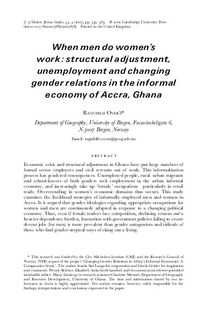| dc.contributor.author | Overå, Ragnhild | |
| dc.date.accessioned | 2018-01-04T08:17:36Z | |
| dc.date.available | 2018-01-04T08:17:36Z | |
| dc.date.issued | 2007-11-30 | |
| dc.identifier | oai:www.cmi.no:2813 | |
| dc.identifier.citation | in Journal of Modern African Studies vol. 45 no. 4 pp. 539-563 | |
| dc.identifier.uri | http://hdl.handle.net/11250/2474774 | |
| dc.description.abstract | Economic crisis and structural adjustment in Ghana have put large numbers of formal sector employees and civil servants out of work. This informalisation process has gendered consequences. Unemployed people, rural-urban migrants and school-leavers of both genders seek employment in the urban informal economy, and increasingly take up ‘female ' occupations - particularly in retail trade. Overcrowding in women's economic domains thus occurs. This study examines the livelihood strategies of informally employed men and women in Accra. It is argued that gender ideologies regarding appropriate occupations for women and men are continuously adapted in response to a changing political economy. Thus, even if female traders face competition, declining returns and a heavier dependency burden, frustration with government policies failing to create decent jobs (for men) is more prevalent than gender antagonism and ridicule of those who find gender-atypical ways of eking out a living. | |
| dc.language.iso | eng | |
| dc.relation | Journal of Modern African Studies | |
| dc.relation | 4 | |
| dc.relation.ispartof | Journal of Modern African Studies | |
| dc.relation.ispartofseries | Journal of Modern African Studies vol. 45 no. 4 | |
| dc.relation.uri | https://www.cmi.no/publications/2813-when-men-do-womens-work-structural-adjustment | |
| dc.subject | Informal Sector | |
| dc.subject | Employment | |
| dc.subject | Gender | |
| dc.subject | Ghana | |
| dc.title | When Men do Women's Work: Structural Adjustment, Unemployment and Changing Gender Relations in the Informal Economy of Accra, Ghana | |
| dc.type | Journal article | |
| dc.type | Peer reviewed | |
| dc.identifier.doi | 10.1017/S0022278X0700287X | |
